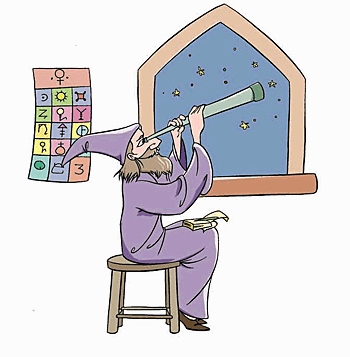-mancy, -mancer, -mantic, -mantical
(Greek: used as a suffix; divination, prophecy, fortune telling; to interpret signs so “practical” decisions can be made [related to -mania])
It isn't so much the things we don't know that gets us into trouble. It's the things we know that aren't so.
If you keep on saying things are going to be bad, you have a good chance of being a prophet.

From their movements, wise men divined the purposes of such deities, taking into account the phases of the moon, eclipses, the proximity of planets to the brighter fixed stars, and other phenomena, including the positions of constellations other than those forming the signs of the zodiac.
Some examples include the new moon rising in a cloudy sky presaged victory in a coming battle, while, if it failed to rise as an anticipated time, it became an omen of defeat.
When astrology advanced as a science, the casting of horoscopes and other exact calculations replaced the old traditions and astromancy became less significant.
Its systems are largely obsolete, but its lore has survived as modern superstitions, such as expecting bad luck if you look at the moon over your left shoulder, or making a quick wish when you see a shooting star.
It’s interesting to note that astromancy became "astrology", and "astrology" became the science we now call "astronomy".
So all the people who made divinations, or avimancies, with the flight and sound of birds, believed that the birds were messengers whose behavior carried encoded messages or signs sent to people by means of the god of the sky.
Axinomancy was practiced by the ancient Creten Greeks to discover a crime. An agate or piece of jet (stone) was placed on a red-hot axe which indicated the guilty person by its motion.
Another explanation suggests that it was a system that was used as a mode of finding a guilty person which consisted of heating an ax head, setting it upright, placing a marble on it, and turning it slowly until the marble rolled in someone’s direction. This same prodedure was considered as one way to find a treasure.
An additional method was to suspend a hand ax, or hatchet, from a string attached to its handle, twirl it and see to whom it pointed when it stopped.
A third, and perhaps the best method, was to drive the ax blade into the top of a post and let it waver there, while a group danced around the post.
When the ax finally fell, its handle was supposed to point to the guilty person if he or she was still around. If she or he was gone, it pointed to the direction in which that person went.
2. Etymology: derived from Late Greek belomantia, from belos, "an arrow" or "a dart".

One of the methods used was for a person to point to a line or passage of an open book with his or her eyes closed. The randomly chosen line was believed to convey a message of significance.
In the Middle Ages, it was trendy to use Virgil's Aeneid and Homer's Illiad. Moslems are said to use the Qur'an for this purpose.
Now, bibliomancy refers to divination which interprets randomly chosen passages from any book. The Bible is still the most frequently used book, although other publications may be used.
The variation of using a book of poetry is called "rhapsodomancy".
"Bletonism" was named after the French bletonist, Monsieur Breton.
Variations included scattering the leaves of vervein (vervain) or heather in a high wind. Another method was by writing sentences on leaves that were exposed to the wind, and the divination would be gathered from those leaves which were left.
Interpretations were also made from the crackling sounds made when certain plants were thrown on the fire or crushed in the hands.
It is also considered a form of pyromancy or the interpretation of burned or burning tree branches and leaves.
Botanomancy is also considered a general term for divination which uses any plant or plant part.
Capnomancy also concerned breathing in the smoke of the sacrificial fire and making prophetic evaluations.
Cross references of word families that are related directly, or indirectly, to: "divination, diviner; seer, soothsayer, prophecy, prophesy, prophet": augur-; auspic-; fa-, fate; Fates in action; futur-; omen; -phemia; sorc-, sorcery; vati-.
A cross reference of other word family units that are related directly, or indirectly, to: "chance, luck, fate": aleato-; auspic-; cad-; fortu-; serendipity; sorc; temer-; tycho-.


